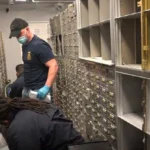Administrative Action by Border and Customs
After your U.S. Currency or other property is seized by an agent with the Department of Homeland Security Investigations (HSI) or Customs and Border Protection (CBP), you have the option of filing an administrative petition or filing a claim for court action. As a general rule, administrative petitions rarely result in money being returned. Instead of filing a petition, the better course of action is to file a verified claim for court action which is the ONLY way to contest the legality of the initial seizure.
What happens if you choose to file an administrative petition and are ultimately dissatisfied with the petition decision (initial petition or supplemental petition)? First of all, you should realize that the Department of Customs and Border Protection takes a “hide the ball” approach in order to discourage you from demanding court action.
The letter for the final administrative action doesn’t explain your rights. But the original notice of seizure explains that you have an additional 60 days from the date of the initial petition decision (or 60 days from the date of the supplemental petition decision or such other time as specified by the Fines, Penalties & Forfeitures Officers) to file a verified claim for court action through a judicial referral.
Although CBP is very close to taking 100% of your money in a forfeiture action, you have one last chance to hire an attorney and demand court action. Don’t make the same mistake again – this time – hire an attorney to help you file a verified claim for court action. This is your last chance to bypass further administrative proceedings which statistically have very little chance of success.
CBP has a very dysfunctional system for sending the petition decision or providing notice to the claimant of their options. By hiring an attorney, you can make sure the verified claim has all of the necessary information and is received by CBP by the deadline. If you received a final administration action letter from CBP concerning the seizure of money or other property for seizure, act quickly. If you do not include all of the correct information or miss a deadline, then the government will take 100% of the money or property through forfeiture. If you hire an experienced attorney to fight the seizure, then you have the best chance of getting all of the money back. Sebastian Rucci is often contacted by other attorneys who want to partner with us to act as co-counsel in cases throughout the United States.
Civil forfeitures laws permit law enforcement to seize property without a conviction and keep what they seize, this has warped law enforcement priorities and decimated public trust in law enforcement.
Final Administrative Action After a CBP Forfeiture
Instead of explaining the options, the “final administrative action” form used by U.S. Customs and Border Protection (CBP) is confusing and incomplete. So what does the word “claim” mean on the form for “final administration action”?
As explained in the initial notice of seizure, the verified claim for court action (sometimes called the “judicial action request”) requires the seizing agency to refer the matter to the U.S. Attorney’s Office. Each U.S. Attorney’s Office has a forfeiture unit and attorneys specially trained to handle civil asset forfeiture matters.
The claim for court action must include all of the requirements listed in the statute and be verified with an oath under penalty of perjury. If CBP does not actually receive (in their hands) a properly verified claim that includes all of the required information, then the property may be administratively forfeited to the United States.
The notice of “final administrative action” advises you that the property seized by the United States Customs and Border Protection, is to be summarily forfeited to the government as provided for in 19 USC 1607, 1608, and 1609, including the amendments enacted by the Customs and Trade Act of 1990 (P.L. 101-382) approved August 20, 1990.
To stop the summary forfeiture proceedings, you must file a verified claim as required by the notice of CBP’s final administrative action, which might be the Port Director of Customs and Border Protection, Office of Fines, Penalties, & Forfeitures, in the appropriate field office.
Follow the directions in the original notice of seizure exactly or hire an experienced attorney to make sure your rights are protected. The notice might provide that the claim must be filed within 30 days from the date of the first publication of the notice of seizure and intent to forfeit. The final administrative action letter will list the date that the first legal notice will appear on the Department of Justice website.
The notice usually provides that the property will be forfeited to the United States and disposed of according to the law if no claim is filed by a specified date listed in the final administrative action letter. If you received such a letter from Customs and Border Protection (CBP) after the seizure of money, contact attorney Sebastian Rucci to discuss the best course of action.
Attorney Sebastian Rucci focuses his law practice on Seizures and Asset Forfeitures
Forfeiture attorney Sebastian Rucci has 27 years of legal experience and FOCUSES HIS PRACTICE ON SEIZURES AND ASSET FORFEITURES. He also works with other attorneys as co-counsel on civil asset forfeiture cases.
Forfeiture attorney Sebastian Rucci will challenge federal asset forfeiture cases throughout the United States. He can file a verified claim for the seized assets, an answer challenging the allegations in the verified forfeiture complaint, seek an adversarial preliminary hearing if one was denied, and challenge the seizure by filing a motion to suppress and dismiss on multiple procedural grounds demanding the immediate return of the seized assets.
Forfeiture attorney Sebastian Rucci can show that the seized assets are not the proceeds of criminal activity and that the agency did not have probable cause to seize the funds or other assets. Even if a showing of probable cause has been made, he can file to rebut the probable cause by demonstrating that the forfeiture statute was not violated, that the agency failed to trace the funds, or showing an affirmative defense that entitles the immediate return of the seized assets.
Forfeiture attorney Sebastian Rucci is available as co-counsel, working with other counsel, where he focuses on challenging the asset forfeiture and seizure aspect of the case throughout the United States. Forfeiture attorney Sebastian Rucci often takes civil asset forfeiture cases on a contingency fee basis, which means that you pay nothing until the money or other asset is returned. Let experienced forfeiture attorney Sebastian Rucci put his experience with federal seizures and forfeiture actions to work for you, call attorney Sebastian Rucci at 330-720-0398.


